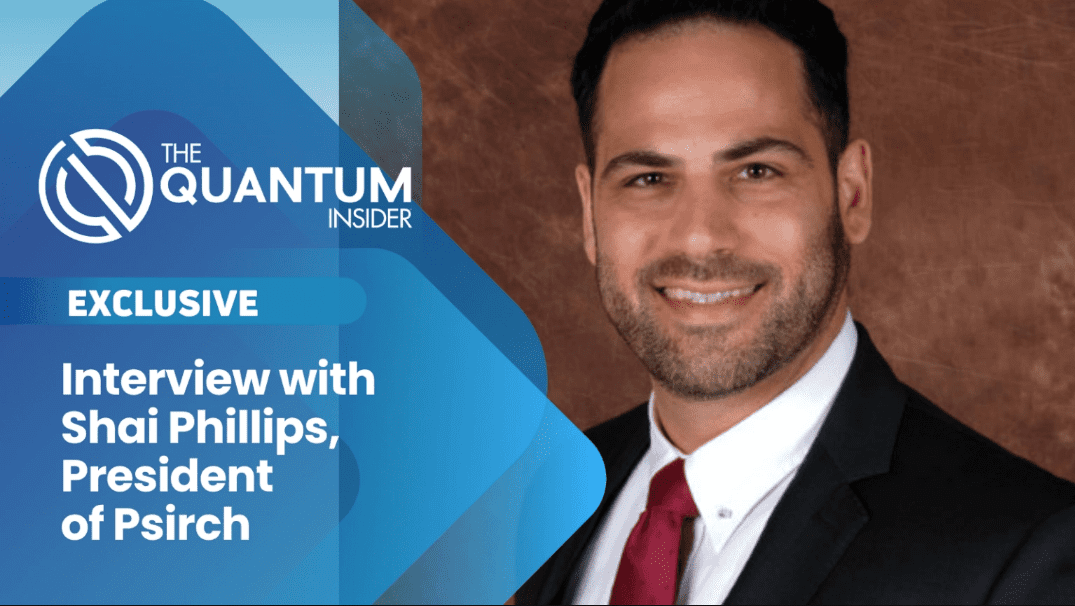Hiring from Quantum versus Non-quantum — an Interview with Shai Phillips, President of Psirch

Quantum Planning
While still in its infancy, Quantum Technology has the capacity to be a transformational tool for verticals such as pharmaceuticals, finance, and materials science. Realizing this, a growing number of visionary leaders and corporations have invested heavily in this area of research and development.
Underpinning much of this is the requirement to build a workforce that is quantum-ready – a prerequisite to establishing a solid foundation for the successful development of quantum programs, as well as to pioneering productive outcomes amidst heavy competition.
Current Headaches
The quantum workforce, like the industry as a whole, is still relatively nascent, not to mention sparsely populated. As an incipient industry, one of the major headaches is in the recruitment of senior leadership, especially relative to other technology verticals.
The Quantum Insider spoke to Shai Phillips, President of Psirch — a company that provides Quantum Technology Executive Search services. It is a new division of Berkhemer Clayton, which is itself a retained executive search firm that has serviced client corporations across the globe for nearly thirty years.
“To hire from quantum versus non-quantum — that’s a poignant question because it’s going to come up a lot. Companies will indeed struggle with this, as the talent pipeline in the quantum space is extremely constrained,†said Phillips.
Philips noted that finding the right technical talent sometimes requires companies to explore academia rather than industry. “There’s a reason that companies, including mega caps such as Google, have been known to search directly in prestigious university physics departments for their quantum leadership — an unusual hiring practice for corporates. There are few in the market who possess a depth of understanding in quantum mechanics to the level of leading faculty experts. At the same time, Chris Monroe of IonQ has pointed out that, in quantum computing, much of the physics is a fait accompli at this stage, and the challenges remaining to be surmounted are by and large engineering challenges first and foremost.â€
So, can you hire from non-quantum backgrounds?
“It depends, Phillips said. “For a non-technical role with a high-level business remit, such as a CEO, that’s certainly feasible. The CEO’s job is to drive overall strategy, appreciate the market and its clientele, and guide certain elements of the company’s finances and workforce. That’s a very macro perspective.â€

I then asked him if it’s important for other executives to have a background in quantum, or at the very least, another deep tech vertical:
“Once again, it depends on the specific position to be filled. Most any position will require a working knowledge of quantum technology to some extent, but that can be learned to the level needed if the role is non-technical in nature. On the other hand, for positions directly involved in R&D, such as Chief Quantum Officer, Chief Technology Officer, Chief Science Officer, or Head of Quantum Research, a seasoned and experienced quantum engineer, or similar, will unquestionably be essential, with no room for compromise on that requirement. It’s at this juncture that knowing the quantum market, its key players, and the intricacies of competing platforms, is going to be so crucial to the outcome of any executive search.â€
Analogue or Digital?
It is here that Phillips made a unique point, and clear warning — one that companies searching the talent pool should heed:
“Hiring from non-quantum for a technical position, even if the employee is a digital wizard, may be a perilous mistake. Whereas digital systems are discrete, quantum systems are fundamentally analog in nature, and as such, qubits (or qudits) have a range of values, not just one or zero. While many quantum computers have been designed to restrict these values via control electronics, that type of “forced digitization†doesn’t change the underlying analog nature of the quantum system itself.â€
“Consequently, making a technical hire from non-quantum technology could be problematic because non-quantum technologists are unaccustomed to the above paradigm. In fact, the foundations of Boolean logic (which underpin every aspect of technology in today’s global digital infrastructure) are so deeply engrained into the mindset of conventional technologists, that problem solving from the standpoint of a values-array, rather than binary operations, may be an insurmountable hurdle. Thus, while a CEO who is unlikely to wrestle so deep in the weeds on product, may be a fine choice for a quantum company even with a non-quantum background, a CTO or similarly technical role from a non-quantum background…not so fine and dandy in light of the above.â€
Psirch’s President went further with a caveat, however, noting that there are exceptions to this: “For example, those working deeply in photonics, especially in instrumentation utilizing single photon detection or other such advanced apparatus, at a company such as Coherent, or II-VI, are already dealing with a quantum medium to a large extent. It is possible that they could make useful additions to a team, and add value in a quantum leadership role. Quantum networks to be developed over the next decade will almost certainly be photonic ones. Still, this is not a “one size fits all†situation. Plenty of execs working in photonics are far afield from quantum. The headhunter or talent acquisition manager will need to use exquisite judgment in making determinations when assessing candidates in this particular ball park.â€
Aware quantum is complex, Phillips maintains that technical roles need deep understanding. For business execs, however, a cursory understanding of quantum may be enough.
